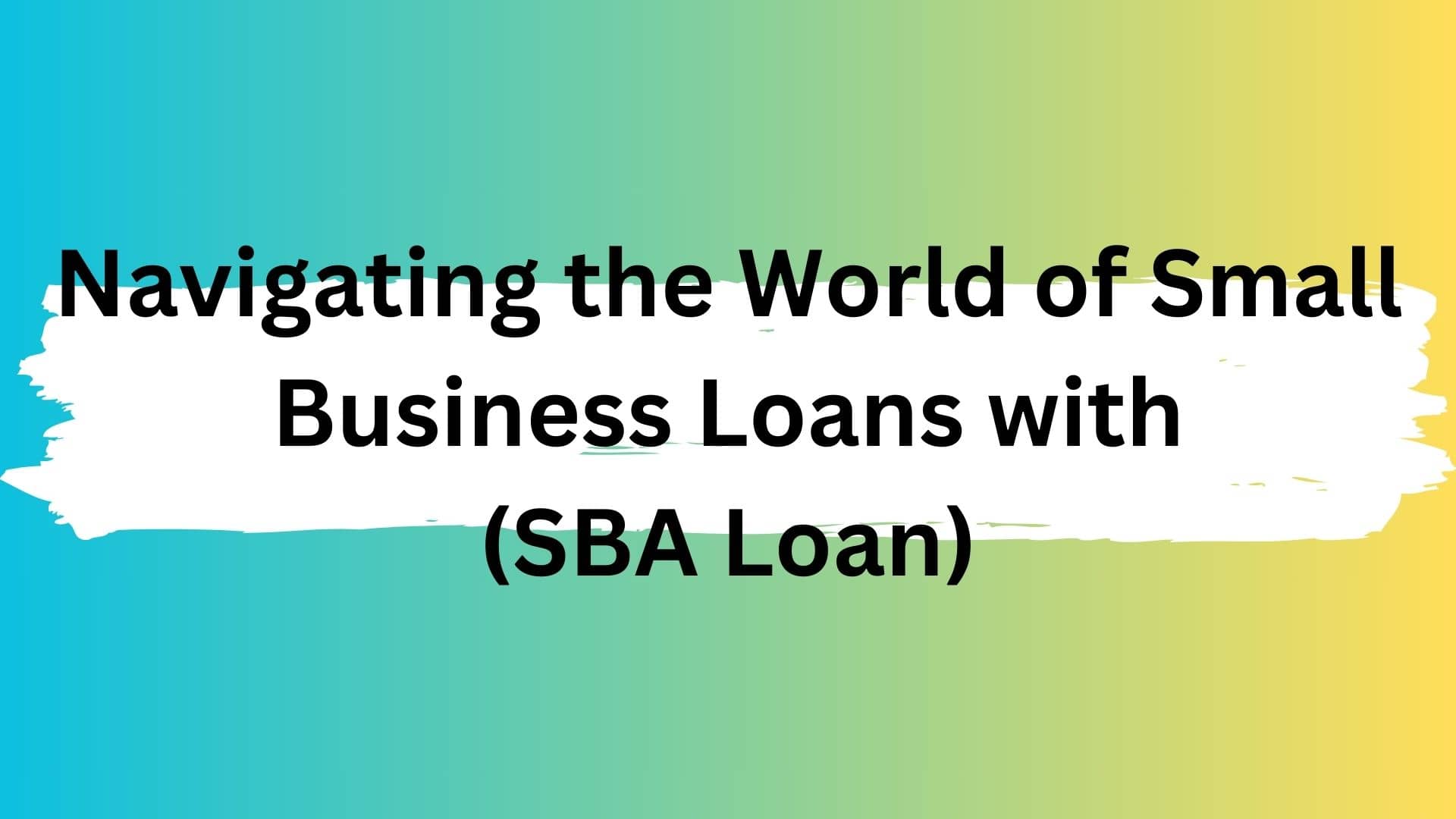It’s a common challenge for small businesses to access the financing they need for growth and expansion. But there is hope: the Small Business Administration (SBA) has loan programs designed specifically with entrepreneurs in mind.
In this guide, we’ll take an in-depth look at SBA loans – covering everything from eligibility requirements to application processes, along with some frequently asked questions – so that by the end of it all you will have a comprehensive understanding of how these loans can be game changers for your business.
What are SBA Loans?
SBA loans are financial products provided by approved lenders but guaranteed by the U.S. Small Business Administration. They act as a critical source of funding for small businesses, offering more favorable terms and conditions than traditional loans.
Eligibility Criteria
To be eligible for an SBA loan, businesses must meet certain criteria set forth by the SBA. These include being independently owned and operated; functioning within the United States or its territories; showing proof that funds are needed; demonstrating attempts to seek other financial means.
Types of Available SBA Loans
There are several different types of loan programs available through the SBA depending on what your business needs may be. Some examples include 7(a) loans which can help cover working capital needs or purchase equipment/inventory, CDC/504 loans for real estate purchases only among others like microloans geared towards startups & smaller enterprises plus disaster recovery assistance following natural disasters such as hurricanes etcetera…
Applying for an SBA Loan
The process starts with finding a lender who is approved and participates in SBA lending programs. Once you’ve chosen your lender, gather all necessary documentation including business financial statements; personal financial statements; tax returns; and collateral documents if applicable before submitting them along side any other required papers asked by the selected bank where one wishes their money borrowed against being deposited at this time should fill out any requested information on these forms accurately without errors made during completion process itself otherwise none of it will matter because nobody can give approval or deny financing based off incomplete records relating to applicant’s ability repay debt service.
SBA Loan Documentation Requirements
Typically, the documentation required for an SBA loan application includes:
Business financial statements (profit and loss statements, balance sheets)
Personal financial statements for business owners
Business plan outlining the purpose of the loan and how it will be used
Tax returns for the business and its owners
Collateral documentation (if applicable)
SBA Loan Approval Process
The length of time it takes to approve an SBA loan varies depending on factors such as complexity of application or lender’s processing speed. Generally speaking though; this involves thoroughly reviewing applicant creditworthiness; repayment ability; business viability etcetera… Upon successful completion applicants should expect funds disbursed according agreed upon terms within agreement reached between both parties involved themselves signifying their understanding thereof through signatures appended at appropriate spaces provided within document itself thereafter copies shall kept safe where they can found easily when needed again in future by either party requiring them.
Repayment Terms and Conditions
Competing Interest Rates: It often has lower interest rates than traditional lenders which makes it a cheap source of finance for small businesses because loans from the SBA equally have competitive interest rates.
Accessibility to Capital: Small enterprises can access funds through SBA loans that might be hard to get using conventional methods. SBA offers financial support for start-up costs, working capital as well as expansion plans among others thus serving as a reliable financing option towards business growth and development.
Government Backing: Among its many advantages is the fact that this organization guarantees some loans on behalf of applicants who are unable or unwilling (due to perceived risks) to qualify under normal circumstances mainly because lenders know they will not lose their money even if things go wrong since U.S Government backs them up through the Small Business Administration.
Different Loan Programs: Depending on your type of business; whether you operate internationally, are minority owned or even just starting up there is probably an sba loan programme for you. The government does not discriminate when giving out these loans but rather tailors each one so that it suits specific needs best therefore ensuring success in whatever area somebody might want venture into.
Supporting Disadvantaged Businesses: This form of debt prioritizes funding for women-owned enterprises; those owned by veterans, people living in rural areas as well as certain ethnic groups such as Hispanics among others too. This commitment to diversity ensures inclusive growth whereby anyone who has good intentions should get financial help regardless their gender or where they come from hence leveling playing field making competition fairer than ever before especially considering that most entrepreneurs do Lack capital due to lack collateral but with sba all this changes.
Business Development Resources: Besides lending money directly through its loan schemes also offers plenty other services meant foster entrepreneurship nationwide including counseling services, mentorship programs educational workshops etcetera thus providing more value addition alongside cash injection necessary realize someone’s dream business succeed and grow beyond imagination
Favorable Terms For Startups: Unlike traditional bank loans, SBA Loans do not require a track record of profitability or establish credit history. This makes them more accessible to new businesses with great ideas but lack the financial muscle required bring such into reality hence becoming popular among many entrepreneurs who want start their own thing
Economic Stimulus: This is because small firms are known to employ more people per unit of capital invested compared larger corporations thereby creating jobs wherever they located across country thus leading general rise in living standards especially among those areas characterized by high levels poverty rate where most individuals depend on self employment for survival.
SBA loans have some disadvantages as well which include:
Rigorous Eligibility Criteria: They may be difficult to obtain due stringent requirements like minimum revenue threshold level being set at $100,000 annually over past three years alongside good personal credit rating among others too. This means that it might not work out for someone whose business has just started thus lacking these necessary qualifications needed get approved by sba lender
Long Processing Times: The approval process can take quite long time when compared with other types commercial lending institutions because it involves thorough documentation review plus sticking government regulations therefore resulting delayed timelines which may not favor those enterprises that need money urgently within short period after application being made.
Potential Personal Guarantee Requirements : In many cases, SBA loans require the borrower (business owner) to provide a personal guarantee which means their individual assets will be used as collateral in case of default hence putting them at risk financially if things go wrong. Some entrepreneurs prefer keeping these two separate while others feel uncomfortable assuming such liabilities on themselves
Collateral Requirements: Even though SBA loans typically offer favorable terms, the lender may still require collateral for securing the loan such as business assets, real estate or personal assets depending on their requirements and the size of the loan. This may be a challenge for enterprises with limited collateral.
Limited Funding Amounts: While small businesses get capital access through SBA loans, sometimes funding amounts might fail to meet larger scale project or expansion full financial needs. In such instances firms will have to seek alternative financing sources or lower their plans.
Potential for Loan Denial: There is always a risk of being denied an SBA loan even after meeting all eligibility criteria and submitting a comprehensive application. This can happen due to changes in economic conditions, industry trends or simply because lenders have discretion over decisions thereby leaving them without anticipated funds.
Prepayment Penalties: Businesses that payback their loans early incur extra charges in form of prepayment penalties which discourages them from refinancing or settling debts before time thus limiting financial flexibilities.
Using SBA Loans Effectively for Business Growth
SBA loans can be very helpful when it comes to fueling growth and expansion within corporations. They can serve different purposes including:
Starting up new business enterprise
Buying equipment or land property
Working capital
Expansion/Growth initiatives
Refinancing debt
Alternatives to Small Business Administration Loans (SBA) For Small Businesses
Although there are many benefits associated with availing oneself off an Sba Loan , some entities might find other forms of financing more suitable. Some examples include traditional bank loans; lines of credit; equipment financing as well crowdfunding among others. It is important therefore that individuals explore every option available before making decisions based on what they believe suits their goals best financially speaking.
FAQs – Frequently Asked Questions about Sba Loans and Their Answers
Positive aspects include low down payments, long repayment terms and low interest rates. Disadvantages may involve strict eligibility requirements, slow processing times and possible need for personal guarantees.
How Do I Use an SBA Loan to Expand My Business?
SBA loans can be used for a variety of purposes such as starting a new company or purchasing equipment or real estate, working capital needs, expansion efforts as well as refinancing existing debt among others.
What are Some Other Options besides SBA Loans for Small Businesses?
Additional financing alternatives include traditional bank loans, lines of credit, equipment financing, crowdfunding campaigns and venture capital investments; each having their own pros and cons so it is important that you evaluate them all before making up your mind.
Final Thoughts
Simply put SBA loan programs are great resources that small businesses can tap into when looking for funds to fuel their growth ambitions. This can be achieved by familiarizing yourself with the qualification requirements set forth by these programs along with the application processes involved plus different types of loans offered under them which will enable you know how best you can leverage on any given program thereby unlocking its full potential towards realizing business success.
Whether it’s a startup or an expansion project you have in mind; SBA loans could offer financial muscle required to see through your plans. So don’t limit yourself but gather necessary documents required for approval then take that leap of faith knowing very well that success awaits at other end.




